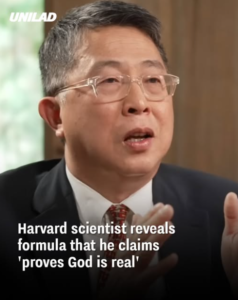In a recent discussion on the Tucker Carlson Network, Dr. Willie Soon, an astrophysicist and aerospace engineer affiliated with Harvard University, proposed a mathematical argument suggesting the existence of a higher intelligence governing the universe. Central to Dr. Soon’s assertion is the “fine-tuning argument,” which posits that the universe’s physical laws are so precisely calibrated to support life that this precision implies intentional design rather than random occurrence.
The Fine-Tuning Argument and Antimatter
Dr. Soon emphasizes the concept of fine-tuning by examining the existence and properties of antimatter. During the Big Bang, both matter and antimatter were produced. Antimatter particles possess opposite charges compared to their matter counterparts, leading to mutual annihilation upon contact. However, an asymmetry exists: there is slightly more matter than antimatter in the universe. This imbalance prevented total annihilation, allowing matter to dominate and form the galaxies, stars, and planets we observe today. Dr. Soon argues that this delicate imbalance is unlikely to be a product of chance, suggesting instead that it points to intentional design. citeturn0search1
Paul Dirac’s Contribution
To bolster his argument, Dr. Soon references the work of British physicist Paul Dirac. In 1928, Dirac formulated a groundbreaking equation that combined quantum mechanics and special relativity, predicting the existence of antimatter—a prediction later confirmed with the discovery of the positron in 1932. Dirac’s equation is renowned for its mathematical elegance and profound implications for our understanding of the universe. Reflecting on the beauty and precision of fundamental physical laws, Dirac once remarked, “One could perhaps describe the situation by saying that God is a mathematician of a very high order, and He used very advanced mathematics in constructing the universe.” citeturn0search0
Implications and Debates
The fine-tuning argument extends beyond antimatter. For instance, the strength of gravity is precisely what it needs to be to allow the formation of galaxies, stars, and planets. A slight variation in gravitational strength could have resulted in a universe where such structures—and consequently, life—could not exist. This precise calibration of fundamental forces has led some scholars, like philosophers Richard Swinburne and Robin Collins, to argue that the universe’s life-permitting conditions are best explained by the existence of a higher intelligence. citeturn0search2
Dr. Soon’s perspective has ignited discussions at the intersection of science, philosophy, and theology. Proponents argue that the mathematical elegance and fine-tuning observed in the universe provide compelling evidence for intentional design. Critics, however, caution against conflating mathematical descriptions with metaphysical conclusions. They argue that while mathematics effectively models physical phenomena, it does not necessarily imply the existence of a designer. Furthermore, some scientists propose alternative explanations for fine-tuning, such as the multiverse hypothesis, which suggests that our universe is just one of many, each with varying physical constants.
Conclusion
Dr. Willie Soon’s invocation of mathematical principles to argue for the existence of a higher intelligence underscores the enduring dialogue between science and philosophy. By highlighting the precise conditions necessary for life and referencing the profound insights of physicists like Paul Dirac, Dr. Soon contributes to a rich tradition of inquiry into the origins and nature of the universe. Whether one interprets the fine-tuning of cosmic constants as evidence of intentional design or as a natural consequence of yet-to-be-understood principles, the discussion invites deeper reflection on the relationship between mathematics, the physical world, and the possibility of a higher intelligence.


